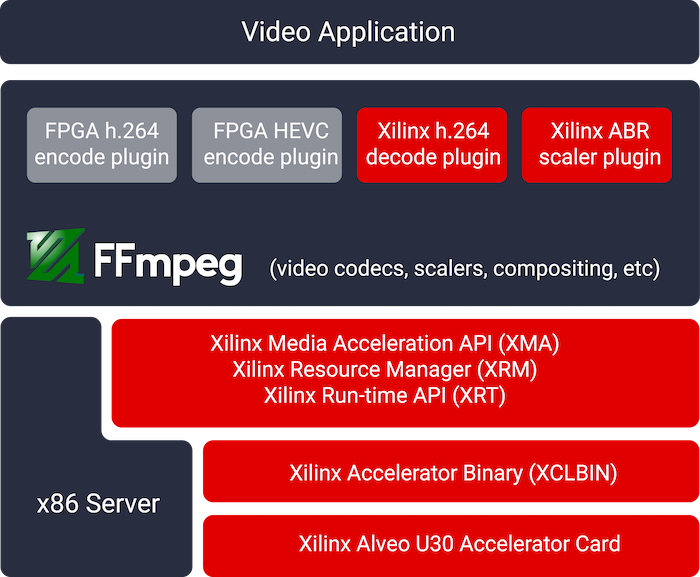Accelerated ABR Scaling and High-Density Transcoding
There has been an accelerated growth in internet video traffic brought on by Covid-19. Video transcoding workloads in eSports, Telemedicine, eCommerce, entertainment, and Distance learning have become more prevalent and computationally more intensive. This has put enormous pressure on Content Delivery Network (CDN) providers to deliver live video content effectively with the lowest CAPEX and compelled them to re-evaluate their hardware infrastructure and software capabilities.
Video streaming has never been more important. CDNs today are typically faced with one or more of these key challenges:
· The costs involved in scaling high-performance streaming servers for video-transcoding
· Provisioning and scaling the hardware infrastructure to effectively meet varying customer bandwidth demands
· How to slash TCO and improve performance of video transcoding workloads while working within existing proprietary frameworks
· Achieving hardware-acceleration levels of performance without the need for hardware development, working within standards like FFmpeg
· The ability to stream live content with the lowest possible latency for applications such like live streaming video games, where real-time user engagement and collaboration are needed to deliver an exceptional user-experience
Xilinx has been providing hardware-accelerated FPGA-based video transcoding solutions to CDNs for many years. We understand the challenges CDNs face today, and we’ve delivered a solution that solves for each of them. We’ve built the Xilinx U30 SDK, a complete software stack that offers easy development with provisioning and capacity management for video streaming infrastructure at scale.

Making ABR Efficient and Cost-Effective
The U30 SDK, coupled with Xilinx Alveo U30 accelerator cards, enables you to accelerate computationally intensive real-time Adaptive Bit Rate (ABR) video transcoding workloads at the highest video channel density and lowest cost.
Now, there are a lot of video transcoding solutions out there that deliver ABR but usually there are some inefficiencies baked in. Many solutions are subject to one of these flaws:
1. They require CPU resources to perform ABR scaling, or
2. ABR scaling on the accelerator card reduces the channel density the card can support
Either of those inefficiencies is going to cost you money and hassles.
In the first case, there are transcoding cards that do encoding and decoding on the card but require the CPU of the server to do the ABR scaling. This puts a heavy load on CPU compute resources. In many cases, the result is that more expensive, more powerful servers are required to support ABR, blowing out your capital costs for zero benefit. In the second case, there are some very popular GPU-based transcoding cards that don’t hand over ABR scaling to the CPU but do force you to consume extra resources on the card to do your scaling. And the result of that? Fewer channels on a card, more cards, more servers, more cost, more management, and more headache.
The Xilinx solution enables scalar, H.264, H.265/HEVC video encoding and decoding capabilities on a single Xilinx U30 accelerator card. This helps free up CPU resources, increases performance, and provides 80% cost saving along with 1/10 the power and 1/4 the space.
Making Transcoding Easy to Develop and Deploy
A key attribute of the U30 SDK is that it accelerates your development time and allows you to seamlessly leverage the hardware-accelerated features of Xilinx Alveo U30 based high channel density video transcoding solution using industry standard FFmpeg. Not only that, but if you’re operating in a proprietary framework, it’s just as easy to take advantage of the U30 solution by integrate with your proprietary framework using C based APIs provided in the U30 SDK.

The U30 SDK is built to grow with your video service, delivering provisioning and capacity management for video streaming infrastructure at scale. The Xilinx Resource Manager (XRM), provided with the U30 SDK, manages and allocates all the hardware-accelerated features, and enables multiple video processing jobs to run across multiple Alveo U30 accelerator cards for seamless workload scaling.
The Xilinx U30SDK Github page provides lots of documentation, video transcoding examples, and video quality assessment tools to stream your video applications quickly.
Straight and FTRT Transcoding
CDNs and video service providers often stream video content after compression using codecs such as H.264 and HEVC for distribution to the consumer. Providers may need to convert an HEVC-encoded stream to H.264/AVC video coding format to take advantage of the superior bit rate savings of HEVC, or recompress a library of content in one codec format to another to reduce storage requirements. The Xilinx U30 SDK enables Straight Real-time Transcoding to convert one media asset from one representation to another in a seamless manner.
There are use cases that require support for Faster than real-time video transcoding. Car buying sites like Autotrader or CarMax want to provide the video back to their customer as quickly as possible. Security services like Ring and Nest want to turn around the video recordings back to their customers as quickly as possible. The faster than real-time feature support on U30 SDK enables CDNs to transcode a 60-mnute 1080p60 quality video in 20 minutes on a single U30 accelerator.
Highest Density, Lowest TCO
The Xilinx Alveo is an adaptable accelerator card built for performance and efficiency to accelerate dynamic workloads in the on-premises data center or the cloud.
The Alveo U30 accelerator card is powered by the Zynq® UltraScale+™ MPSoC, a power-optimized all-programmable system-on-chip (SoC) with integrated video codec and graphics engines for ultra-high-definition video. The U30 card supports both the H.264 and HEVC (H.265) codecs and is capable of streaming up to sixteen 1080p30 channels per card.
With the Alveo U30 accelerator-based high channel density live video transcoding solution, Xilinx offers the best compression efficiency for CDNs with a deterministic number of channels at a lower cost and lower power consumption per stream compared to software and GPU based encoding.
Want to learn more? Join us for a webinar where attendees can learn hw our high channel density live video transcoding appliances and FFmpeg framework can have you ready to stream quickly and easily. Register today.